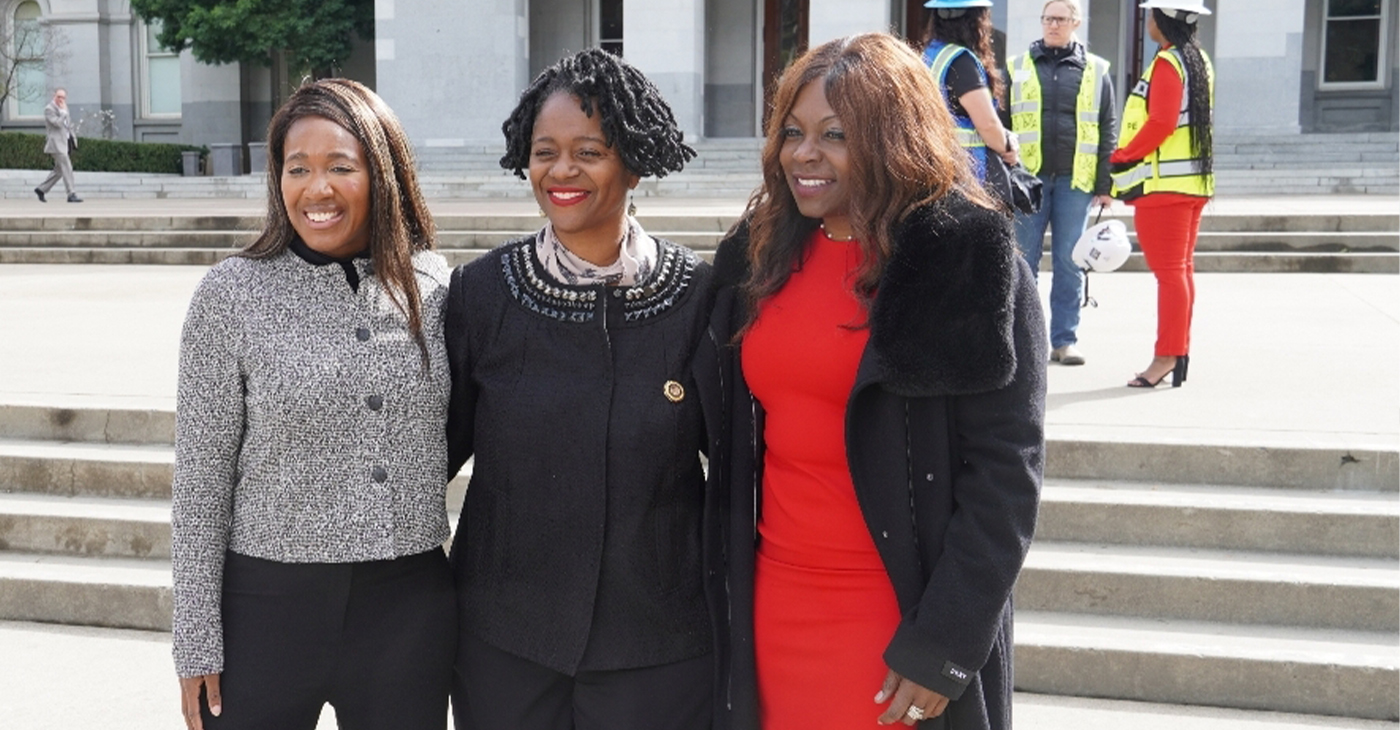Politics
Amid Criticism, Clinton Sticks to Low-Key Campaign Strategy

Democratic presidential candidate Hillary Rodham Clinton stops at Em’s Coffee Co., Tuesday, May 19, 2015, in Independence, Iowa. (AP Photo/Charlie Neibergall)
JULIE PACE, AP White House Correspondent
CEDAR FALLS, Iowa (AP) — During two days of campaigning this week in Iowa, Hillary Rodham Clinton didn’t make a formal speech. She answered questions from reporters, but only for five minutes. Pressed by a moderator at her own event to say where she stood on a trade pact that’s dividing her party, she steered clear.
It was the kind of trip that infuriates her Republican critics, yet gives them fodder to keep up their argument she’s a candidate dodging tough issues and avoiding taking positions that could haunt her politically. That’s started to worry some Democrats, who are publicly prodding Clinton to wade deeper into the political fray and pick a side on the Trans-Pacific Partnership free trade deal.
Clinton and her team are unmoved. They’re sticking to their plans for a low-key start to her second presidential campaign, displaying an early level of discipline that was lacking when Clinton sought the White House in 2008 and struggled with campaign infighting over strategy.
It’s an approach they’ve crafted to show voters Clinton isn’t taking the Democratic nomination for granted. Yet by not taking a stand on issues of the day and dismissing some of the traditional trappings of presidential campaigns, some political operatives say Clinton risks appearing as if she’s doing just that.
“There is a demand if you are a candidate to signify a lack of entitlement by submitting yourself to questions from the news media on a regular basis,” said David Axelrod, a longtime adviser to President Barack Obama. “There is risk to that, but it is a risk that comes along with the task of running for president.”
Before a brief exchange with reporters Tuesday, Clinton hadn’t taken questions from the press in nearly a month. Republican presidential hopefuls seized on her reluctance to engage with reporters and repeatedly mocked her for ducking questions.
“You can’t script your way to the presidency,” said Jeb Bush, the former Florida governor.
So far, Clinton’s campaign does have the appearance of a carefully choreographed operation. Each of her stops in the early-voting states has looked similar to her two-day swing through Iowa this week, where she attended a meet-and-greet with local officials and campaign volunteers at a home in Mason City, discussed economic policy with small business owners at a bicycle shop in Cedar Falls, and dropped by a coffee shop in Independence for an espresso and sandwich.
The house party she attended in Mason City was invitation-only and, as with her past policy roundtables, participants at the small business event were selected by the campaign.
Even when unexpected moments arise, Clinton sticks to her script. When a small business owner asked her Tuesday to state her position on the Trans-Pacific Partnership trade pact, Clinton politely refused.
“I want to judge the final agreement,” she said.
Clinton’s advisers intended her campaign to start slowly. She will hold a more formal campaign kick-off next month, likely with a major speech and a series of one-on-one interviews. But even as the campaign enters that phase, aides say Clinton will still do the smaller events like those she’s held so far.
Though she never mentioned her critics directly, Clinton pushed back this week at those who say she should be taking a different approach.
“Somebody asked me the other day, ‘Well, you’re going to these events where you’re taking time to actually talk and listen to people, is that really what you’re going to do?'” she said Monday. “And I said, ‘Well, yes it is.'”
Clinton’s advisers also dispute the notion she is avoiding taking positions on policy, pointing to her backing of Obama’s executive actions on immigration and her call to outfit police departments with body cameras. On Tuesday, she voiced her opposition to Republican-backed legislation that would revamp the 2010 Dodd-Frank financial regulation law.
But each was unveiled as part of a careful rollout by Clinton’s campaign. She’s been far less willing to weigh in on issues that don’t fit with her campaign schedule, including the fall of Ramadi to Islamic State militants in Iraq over the weekend.
Clinton’s sidestepping on the Asia-Pacific trade pact has been most notable, given that Congress is currently debating whether to give Obama the ability to seek faster ratification of a final deal.
While Clinton called the pact the “gold standard” of trade agreements while serving as secretary of state, she has refused to take a position on the deal since announcing her candidacy.
As Clinton spoke to small business owners in Cedar Falls on Tuesday, a small group of protesters stood outside demanding she clarify her stance on the trade pact. Chris Schwartz, an Iowa organizer with the liberal group Americans for Democratic Action, said Clinton’s silence was “troubling.”
“People in Iowa and people across the country want to know the specifics on all of these issues, including TPP,” Schwartz said, referring to the Trans-Pacific Partnership. “We have a right to have our questions answered.”
___
Follow Julie Pace on Twitter at: http://twitter.com/jpaceDC
Copyright 2015 The Associated Press. All rights reserved. This material may not be published, broadcast, rewritten or redistributed.
Activism
Oakland Post: Week of March 28 – April 1, 2025
The printed Weekly Edition of the Oakland Post: Week of March 28 – April 1, 2025

To enlarge your view of this issue, use the slider, magnifying glass icon or full page icon in the lower right corner of the browser window.
Activism
Sen. Lola Smallwood-Cuevas Honors California Women in Construction with State Proclamation, Policy Ideas
“Women play an important role in building our communities, yet they remain vastly underrepresented in the construction industry,” Smallwood-Cuevas stated. “This resolution not only recognizes their incredible contributions but also the need to break barriers — like gender discrimination.

By Antonio Ray Harvey, California Black Media
To honor Women in Construction Week, Sen. Lola Smallwood-Cuevas (D-Los Angeles), a member of the California Legislative Black Caucus (CLBC), introduced Senate Concurrent Resolution (SCR) 30 in the State Legislature on March 6. This resolution pays tribute to women and highlights their contributions to the building industry.
The measure designates March 2, 2025, to March 8, 2025, as Women in Construction Week in California. It passed 34-0 on the Senate floor.
“Women play an important role in building our communities, yet they remain vastly underrepresented in the construction industry,” Smallwood-Cuevas stated. “This resolution not only recognizes their incredible contributions but also the need to break barriers — like gender discrimination.
Authored by Assemblymember Liz Ortega (D-San Leandro), another bill, Assembly Concurrent Resolution (ACR) 28, also recognized women in the construction industry.
The resolution advanced out of the Assembly Committee on Rules with a 10-0 vote.
The weeklong event coincides with the National Association of Women In Construction (NAWIC) celebration that started in 1998 and has grown and expanded every year since.
The same week in front of the State Capitol, Smallwood, Lt. Gov. Eleni Kounalakis, Assemblymember Josh Hoover (R-Folsom), and Assemblymember Maggie Krell (D-Sacramento), attended a brunch organized by a local chapter of NAWIC.
Two of the guest speakers were Dr. Giovanna Brasfield, CEO of Los Angeles-based Brasfield and Associates, and Jennifer Todd, President and Founder of LMS General Contractors.
Todd is the youngest Black woman to receive a California’s Contractors State License Board (A) General Engineering license. An advocate for women of different backgrounds, Todd she said she has been a woman in construction for the last 16 years despite going through some trying times.
A graduate of Arizona State University’s’ Sandra Day O’Connor College of Law, in 2009 Todd created an apprenticeship training program, A Greener Tomorrow, designed toward the advancement of unemployed and underemployed people of color.
“I always say, ‘I love an industry that doesn’t love me back,’” Todd said. “Being young, female and minority, I am often in spaces where people don’t look like me, they don’t reflect my values, they don’t reflect my experiences, and I so persevere in spite of it all.”
According to the U.S. Bureau of Labor Statistics, only 11.2% of the construction workforce across the country are female. Overall, 87.3% of the female construction workers are White, 35.1% are Latinas, 2.1% are Asians, and 6.5% are Black women, the report reveals.
The National Association of Home Builders reported that as of 2022, the states with the largest number of women working in construction were Texas (137,000), California (135,000) and Florida (119,000). The three states alone represent 30% of all women employed in the industry.
Sen. Susan Rubio (D-Baldwin Park) and the California Legislative Women’s Caucus supported Smallwood-Cuevas’ SCR 30 and requested that more energy be poured into bringing awareness to the severe gender gap in the construction field.
“The construction trade are a proven path to a solid career. and we have an ongoing shortage, and this is a time for us to do better breaking down the barriers to help the people get into this sector,” Rubio said.
Bay Area
Five Years After COVID-19 Began, a Struggling Child Care Workforce Faces New Threats
Five years ago, as COVID-19 lockdowns and school closures began, most early educators continued to work in person, risking their own health and that of their families. “Early educators were called essential, but they weren’t provided with the personal protective equipment they needed to stay safe,” said CSCCE Executive Director Lea Austin. “There were no special shopping hours or ways for them to access safety materials in those early and scary months of the pandemic, leaving them to compete with other shoppers. One state even advised them to wear trash bags if they couldn’t find PPE.”

UC Berkeley News
In the first eight months of the COVID-19 pandemic alone, 166,000 childcare jobs were lost across the nation. Significant recovery didn’t begin until the advent of American Rescue Plan Act (ARPA) Child Care Stabilization funds in April 2021.
Today, child care employment is back to slightly above pre-pandemic levels, but job growth has remained sluggish at 1.4% since ARPA funding allocations ended in October 2023, according to analysis by the Center for the Study of Child Care Employment (CSCCE) at UC Berkeley. In the last six months, childcare employment has hovered around 1.1 million.
Yet more than two million American parents report job changes due to problems accessing child care. Why does the childcare sector continue to face a workforce crisis that has predated the pandemic? Inadequate compensation drives high turnover rates and workforce shortages that predate the pandemic. Early childhood educators are skilled professionals; many have more than 15 years of experience and a college degree, but their compensation does not reflect their expertise. The national median hourly wage is $13.07, and only a small proportion of early educators receive benefits.
And now a new round of challenges is about to hit childcare. The low wages paid in early care and education result in 43% of early educator families depending on at least one public support program, such as Medicaid or food stamps, both of which are threatened by potential federal funding cuts. Job numbers will likely fall as many early childhood educators need to find jobs with healthcare benefits or better pay.
In addition, one in five child care workers are immigrants, and executive orders driving deportation and ICE raids will further devastate the entire early care and education system. These stresses are part of the historical lack of respect the workforce faces, despite all they contribute to children, families, and the economy.
Five years ago, as COVID-19 lockdowns and school closures began, most early educators continued to work in person, risking their own health and that of their families. “Early educators were called essential, but they weren’t provided with the personal protective equipment they needed to stay safe,” said CSCCE Executive Director Lea Austin. “There were no special shopping hours or ways for them to access safety materials in those early and scary months of the pandemic, leaving them to compete with other shoppers. One state even advised them to wear trash bags if they couldn’t find PPE.”
The economic impact was equally dire. Even as many providers tried to remain open to ensure their financial security, the combination of higher costs to meet safety protocols and lower revenue from fewer children enrolled led to job losses, increased debt, and program closures.
Eventually, the federal government responded with historic short-term investments through ARPA, which stabilized childcare programs. These funds provided money to increase pay or provide financial relief to early educators to improve their income and well-being. The childcare sector began to slowly recover. Larger job gains were made in 2022 and 2023, and as of November 2023, national job numbers had slightly surpassed pre-pandemic levels, though state and metro areas continued to fluctuate.
Many states have continued to support the workforce after ARPA funding expired in late 2024. In Maine, a salary supplement initiative has provided monthly stipends of $240-$540 to educators working in licensed home- or center-based care, based on education and experience, making it one of the nation’s leaders in its support of early educators. Early educators say the program has enabled them to raise wages, which has improved staff retention. Yet now, Governor Janet Mills is considering cutting the stipend program in half.
“History shows that once an emergency is perceived to have passed, public funding that supports the early care and education workforce is pulled,” says Austin. “You can’t build a stable childcare workforce and system without consistent public investment and respect for all that early educators contribute.”
The Center for the Study of Childcare Employment is the source of this story.
-

 #NNPA BlackPress4 weeks ago
#NNPA BlackPress4 weeks agoTarget Takes a Hit: $12.4 Billion Wiped Out as Boycotts Grow
-

 Activism4 weeks ago
Activism4 weeks agoUndocumented Workers Are Struggling to Feed Themselves. Slashed Budgets and New Immigration Policies Bring Fresh Challenges
-

 #NNPA BlackPress4 weeks ago
#NNPA BlackPress4 weeks agoBREAKING Groundbreaking Singer Angie Stone Dies in Car Accident at 63
-

 Activism4 weeks ago
Activism4 weeks agoOakland Post: Week of February 26 – March 4, 2025
-

 #NNPA BlackPress4 weeks ago
#NNPA BlackPress4 weeks agoNAACP Legend and Freedom Fighter Hazel Dukes Passes
-

 Arts and Culture4 weeks ago
Arts and Culture4 weeks agoBeverly Lorraine Greene: A Pioneering Architect and Symbol of Possibility and Progress
-

 #NNPA BlackPress4 weeks ago
#NNPA BlackPress4 weeks agoTrump Kicks the Ukrainian President Out of the White House
-

 #NNPA BlackPress4 weeks ago
#NNPA BlackPress4 weeks agoApple Shareholders Reject Effort to Dismantle DEI Initiatives, Approve $500 Billion U.S. Investment Plan

























































